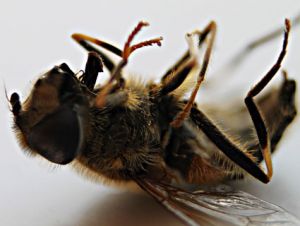Environment & Energy
Related: About this forum90 Percent of Corn Seeds Are Coated With Bayer's Bee-Decimating Pesticide
http://www.motherjones.com/tom-philpott/2012/05/catching-my-reading-ahead-pesticide-industry-confab
'm doing something very odd this week: speaking at the annual conference of Croplife America, the main trade group for the US agrichemical industry. Croplife members include Monsanto, Dow, Bayer, and Syngenta, all massive multinational companies I write about regularly and witheringly. I am astonished that Croplife wants to hear what I have to say—what I think of the group's member companies and their products is a matter of public record—and am curious to hear what they have to say to me.
As I prepared for the conference, a few interesting news items on the industry crossed my desk.
• As I've written before, Bayer's neonicotinoid pesticides, which now coat upwards of 90 percent of US corn seeds and seeds of increasing portions of other major crops like soy, have emerged as a likely trigger for colony collapse disorder. Watch this NBC News report from last week linking bee kills in Minnesota to Bayer's highly profitable product.
Meanwhile, the Columbus Dispatch reports similar bee die-offs in Ohio farm country, with beekeepers there, too, pointing the finger at Bayer.
• One of my biggest complaints about the agrichemical industry it its market dominance. As I say above, more than 90 percent of corn seeds planted today are treated with Bayer's pesticide. What if a farmer wants to opt out, to plant seeds free of neonicotinoids? Good luck. According to a Pesticide Action Network press release I received today, farmers in the midwest are complaining that it's virtually impossible to buy untreated seeds. In other words, farmers there have two choices: either pay up for Bayer's poison, or exit the corn-growing business.
soc7
(53 posts)dpibel
(3,833 posts)The Heartland Institute?
Are you serious?
The same people who tell us about the great scientific conspiracy called global warming?
The ones who get bucks from, inter alia, the Koch brothers?
That is your source?
Not to mention your rather dubious syllogism:
MP: Widely reported research is emerging tying a chemical to an effect.
mp: One time, there was widely reported research tying a chemical to an effect, which research (according to the Hearland Institute) was wrong.
C: The current research is wrong.
Anybody spot a problem with that?
hatrack
(64,527 posts)OFFS
Lionessa
(3,894 posts)the specific dusting and then repeat each year till any internal biologic issues also recede.
Isn't this what farmer's used to do anyway. Why on earth would a corn farmer buy seeds? Makes no sense unless one wanted seeds other than what he already grows.
Most of the top-producing seed lines are hybrids. You can't save seed from them.
For those growing GMO corn, the seed is patented, and you'll get sued if you save it.
DCKit
(18,541 posts)Besides, MonSatan or AGM would sue your pants off.
kristopher
(29,798 posts)http://blog.ucsusa.org/genetically-engineered-crops-in-the-real-world-bt-corn-insecticide-use-and-honeybees-2
Rhiannon12866
(252,314 posts)It's getting so it's frightening just to eat, and vegetables are supposed to be good for you. ![]()
kristopher
(29,798 posts)Yum - it was tasty. Our tomato, cucumber and watermelon garden is well started but we'll still be eating supermarket produce for a couple of months yet.
The issue raised with the GM corn and increased pesticide use is more the ecological consequence than the health effect. I'm not well versed in this matter but from the readings I did last night, previous practices used different and lesser total amounts of insecticides but those were more harmful to humans and applied in greater concentrations. The pesticide for GE corn is one that harms bees and is used on all of the GE corn, so total quantity introduced into the ecosystem is larger than before. It appears that the seeding process itself releases some quantity into the air where it is dispersed on pollen.
Bon appetit
GliderGuider
(21,088 posts)It's pricey, but the organics taste better. Because of the prevalence of GMO corn, many prepared foods are now off the list. It's a real incentive to put in a garden...
